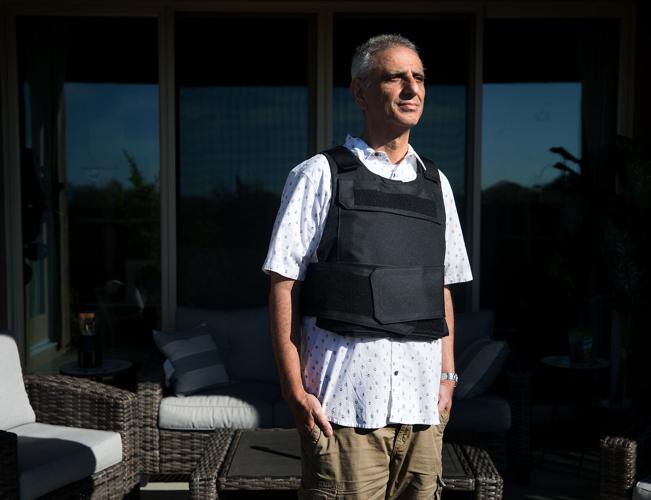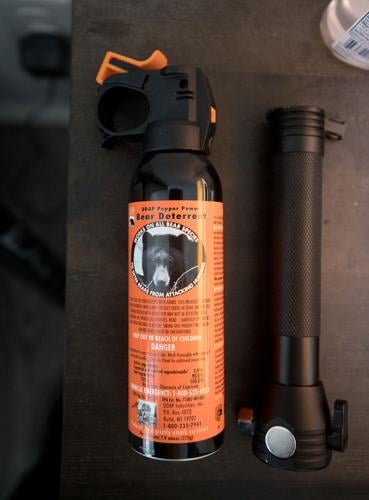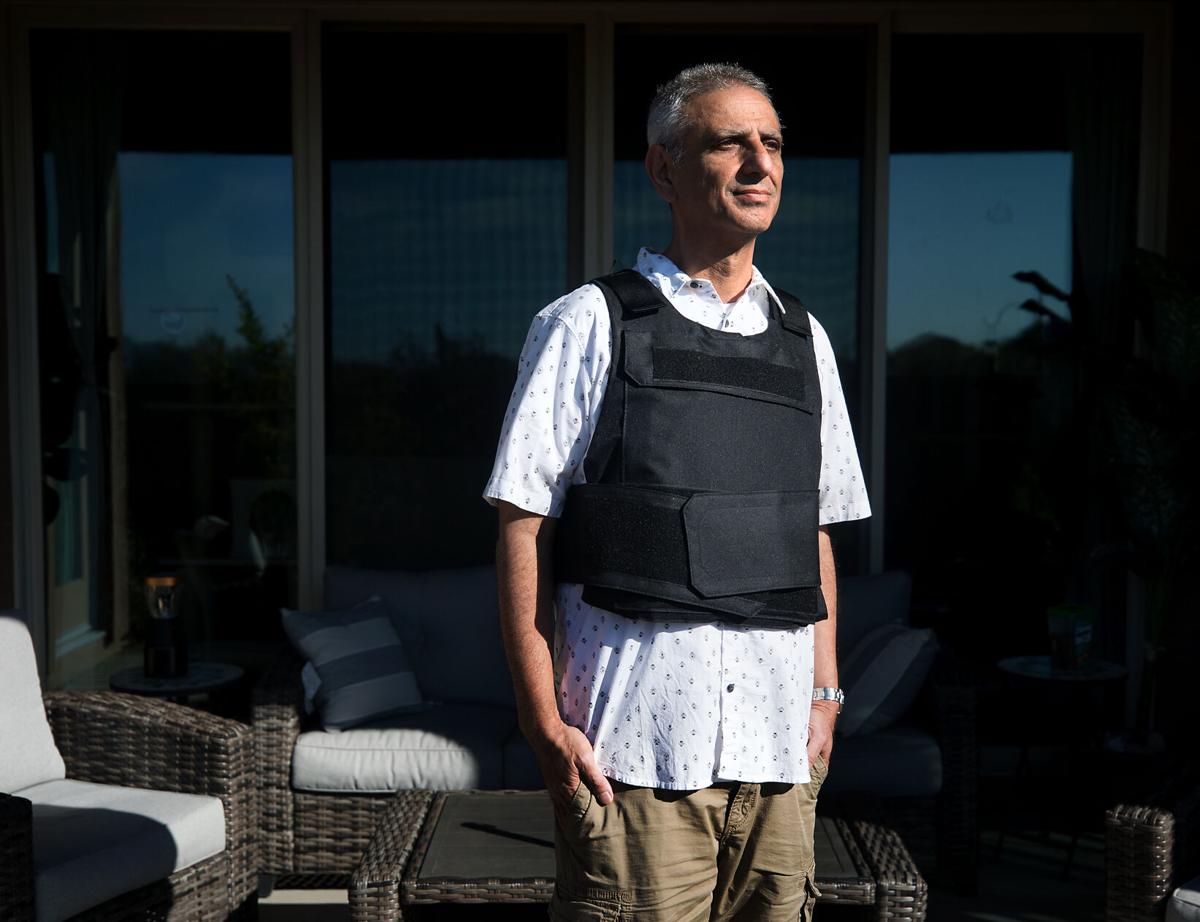In January, Eyad Atallah was already feeling so threatened by a grad student in his department at the University of Arizona that he bought himself a bullet-proof vest.
Atallah, an assistant professor of practice, was planning to wear the vest when he taught classes in the Hydrology and Atmospheric Sciences Department, but it was too bulky.
“I was trying to test if I could hide it under my clothes,” Atallah told me Wednesday. “I realized that wasn’t going to work. My thought process was that I shouldn’t wear it, because if he can tell that I’m wearing it, he’s just going to shoot me in the head. Otherwise, at least if he shoots me somewhere else, I might live.”
These were the calculations that Atallah, a self-described “weather nerd,” was going through just to keep teaching classes like Dynamic Meteorology II at the UA nine months ago. The man he feared was Murad Dervish, then a graduate student on his way to expulsion from the UA. Dervish had treated Atallah as a sort of confidante but also had sent him many menacing text messages.
Now Dervish is charged with murdering department head Thomas Meixner Oct. 5 in the Harshbarger Building where Hydrology and Atmospheric Sciences was based. He has pleaded not guilty. Atallah is convinced that Dervish was looking to find him that day, too.
Atallah decided to tell me his story even though he doesn’t have tenure and works on year-long teaching contracts. Sitting in the downtown office of his attorney, Priscilla Frisby, accompanied by his brother Amjad, Atallah said he’s speaking out now for the same reason he reported Dervish to the dean of students in January, even though he assumed it would make him a target .

Meixner
“What else can I do?” he said. “I didn’t stop this event — maybe something that we talk about, something that is legislated, something that is done policy-wise, makes this not happen again.”
Atallah’s story reinforces the main concern about Meixner’s death — that something more should have been done to protect university students and employees from a known and reported threat. But it also adds key details. Among them:
Although Meixner was Catholic, his killing could be considered an anti-Semitic attack. Dervish was convinced that Meixner was Jewish.
The threats felt by Atallah not only cost him his sense of security but also money, as he sought to protect himself.
Dervish avoided directly threatening people, making it harder for prosecutors to press a case against him.
‘I was essentially a hostage’
Atallah got to know Dervish when he was a student in Atallah’s small Weather Analysis and Forecasting class in fall, 2021. A fellow “weather geek,” as Atallah termed him, Dervish would visit Atallah in his office to talk about weather.
Things were normal for a couple of months, until Dervish got into a conflict with a different faculty member over a grade. That’s when Dervish began contacting Atallah and seeking advice, Atallah said, showing numerous text messages.
“I think I was for him the only point of contact he had,” Atallah said. He later learned Dervish, “didn’t have any religious affiliation. He didn’t have friends in Tucson. And he was estranged from his family.”
Atallah invited Dervish and other grad students who might not have anywhere to go over to his house for Thanksgiving, a move he later regretted.
“This created problems down the road, he said. “It meant he had been to my house.”

Eyad Atallah, a professor in atmospheric sciences at the University of Arizona, says he kept bear spray, a utility flashlight and a bat by the side of his bed after he started receiving threatening text messages from Murad Dervish, a former student.
But things didn’t really blow up until the department, led by Meixner, told Dervish they were not retaining him as a teaching assistant for spring semester.
“I was trying to get him to focus on legal things, because I was starting to get the impression that this was going to become a bigger and bigger issue, because of the obsessive nature of his communications with me,” Atallah said. Over Christmas break, “He would call me three or four times a day.”
It got much worse in January. On Jan. 11, Atallah said, Dervish told him he had done a background search about Atallah and Meixner on the website mylife.com, and the result said that Meixner was Jewish. After that, many of his text messages, which Atallah shared with me, were anti-Semitic, accusing Meixner of orchestrating a Jewish- and Asian-led conspiracy against him, accusing Atallah of cooperating, wishing death on all Jews.
“As Arabs we’re supposed to stick together and I trusted you, and instead you’re a filthy k*** lover who’s been deceived by them, but I really can’t blame you, they’re very deceptive. I would hate to find out you were 1 of them,” Dervish wrote on Jan. 14.
“You’re absolutely either a k*** or doing their bidding.”
Of Meixner, he wrote: “To be honest, I think you’re lying about him being Christian, I’ve never seen one act like that even the fake ones!!”
These texts prompted Atallah to warn Meixner that he was in danger. But he decided to continue the dialogue to monitor the danger that he thought Dervish posed.
“I knew I was essentially a hostage,” Atallah said last week. “And I knew that when he found out I was reporting this, that my life was in danger.”
‘He would have the drop on me’
Atallah moved to Tucson at the beginning of fall semester 2019 to take a position at the UA, after 15 years at McGill University in Montreal. When the COVID-19 pandemic took hold, he moved his mother, who is widowed, here from the Washington D.C. area, and they live together in a home they had built.
After the anti-Semitic, conspiratorial texts started coming across, and Atallah reported them to the dean of students, he started increasing his security at the house. He started carrying bear spray and a flashlight with a window-breaking tool. He bought the ballistic vest. And he considered buying a gun. The security measures he took, he estimated, cost $1,000 to $1,500.

Eyad Atallah installed an expensive security door at his home after he started receiving threatening text messages from Murad Dervish, a former student.
“I considered (carrying a gun) even though I wasn’t allowed. But I’m not a gun person, never have been, and I know my mom hates the idea of having one in the house,” Atallah said. “At the end I always knew that he would have the drop on me. He would open the door to my office or walk in.”
“My hope was just that I was going to see him before he saw me.”
Martha Whitaker, an associate professor of hydrology in the department, told me that around this time she realized Atallah was fearing for his life. They began making arrangements for Whitaker to get Atallah’s house keys so that she could take care of his cats in case the worst happened.
Atallah and his mother stayed at a hotel when there were potentially triggering events happening in Dervish’s disciplinary case at the UA, Atallah said. They also stayed a couple of days at a house that the associate head of the department, Prof. Christopher Castro, found for them.
The university also took some steps. They temporarily moved the department’s classes out of the Harshbarger Building, but by then Atallah was barely showing up on campus.
“I would literally go to the university, teach my class, walk back to my car and drive home,” he said. “Every time I was walking on campus I would walk and do 360s every few steps.”
“I found it difficult to function. I felt like a hostage who was trying to negotiate my own release. And I didn’t feel qualified to do that.”

Impact sensors on doors and windows at the home of Eyad Atallah.
‘Consequences will be absolutely catastrophic’
On Monday, UA President Robert Robbins responded to criticism that the UA didn’t do enough to protect Meixner as well as colleagues like Castro and Atallah by putting out an all-campus memo outlining the steps the university did take. He has also ordered an investigation by outside experts. Among the things the university did do: The University of Arizona Police Department brought misdemeanor cases against Dervish to the Pima County Attorney’s Office in April and again in September.
With that, blame seemed to shift to the prosecutors downtown. Pima County Attorney Laura Conover put out a news release Monday evening acknowledging the cases.
“Both times those concerns were given our full attention,” she said. “However, in neither instance did the facts of the complaint meet the evidentiary requirements for charging him with the crime of Threats and Intimidation at that time under A.R.S. 13-1202.”
Atallah believes Dervish, who had previously been convicted of crimes and spent time in prison, deliberately avoided making direct threats. The most direct threat he ever made to Atallah was to text, “I hope somebody blows your (expletive) brains out.”
In other texts to Atallah, Dervish sought to clarify whether university officials said he “threatened” somebody “or just used threatening language?”
And police reports released by the Pima County Attorney’s Office last week, in response to public records requests, show Dervish cursed out a UA administrator in an April 14 email, saying the department “needs to fix your own terrible decisions.”
“If you don’t I promise the consequences will be absolutely catastrophic,” he said to close the email.
University police visited him at home the next day and told him they were citing him for threats and intimidation, the charges that the Pima County Attorney’s Office later decided not to pursue.
The day after that, April 16, Dervish wrote back to the administrator and said, “I suppose I should apologize, I was referring to legal action.”
“In my conversations with him, it was clear that he understood the difference between making a threat that was legally actionable versus being menacing,” Atallah said.
‘I just don’t in my heart feel that this was unavoidable’
The day that Dervish is accused of going to the Harshbarger Buildling and shooting Meixner was, coincidentally or not, Yom Kippur, the holiest day in the Jewish calendar. The faculty had gone that morning to a memorial service for a graduate student who committed suicide Sept. 14 in the Harshbarger Building.
Atallah said he stayed in his office for an hour or two before leaving for home. But this was the new office Meixner had given him after Dervish was expelled, not the office Dervish knew. Now graduate students were in the old one.
Those students told Atallah after the shooting that Dervish first went to Atallah’s old office and asked the grad students where Atallah was.
“I either left the building shortly before he entered, or I left in between the time that he first entered and the time that he shot Tom,” Atallah said.
Whitaker called him as he drove up Mountain Avenue to warn him that there had been a shooting in the building and that Dervish was there.
“I wanted to be sure he wasn’t in the office,” she said. “I knew he was a target.”
Like other faculty members who had been seeking protection from Dervish, Atallah was upset the afternoon of the shooting when he heard the new UA police chief, Paula Balafas, say at a news conference that such attacks aren’t predictable, and advise, “if you see something, don’t just say something but do something. If you know somebody is struggling with mental health or anger issues, reach out.”
“That was a gut punch,” he said of Balafas’ comments. He, Meixner, Castro and others had done just that for months as they struggled to protect themselves.
After reading Robbins’ statement Monday, Atallah acknowledged that the university had taken some steps, but said “it’s still possible to feel abandoned.” Indeed, Atallah and colleagues were largely on their own for 10 months, in his case spending money on hotels and security as well as living like a hostage.
“My mind keeps going back to, that someone like this threatening a group of people for 10 months, and then killing — this sounds so terrible — thankfully only one of us, that can’t be considered a fait accompli. It can’t be considered an ‘Oh well, these things happen.’ I just don’t in my heart feel that this was unavoidable.”
Tim Steller is an opinion columnist. A 25-year veteran of reporting and editing, he digs into issues and stories that matter in the Tucson area, reports the results and tells you his conclusions. Contact him at tsteller@tucson.com or 520-807-7789. On Twitter: @senyorreporter









